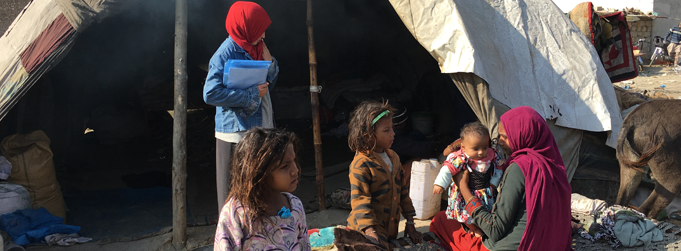
9 March 2016 – Women are at the centre of the polio eradication effort in Pakistan. Thousands of women: vaccinators, lady health workers, social mobilizers, union council polio workers, area coordinators, polio eradication officers work with communities every day to deliver vital immunizations against polio and other vaccine preventable diseases.
Noorjahan was a school teacher before she joined the polio programme, a move she made to make sure her children would grow up in a polio-free Pakistan.
“When I started I didn’t know a lot about polio. I saw it is a very painful disease, but as a mother (of two), when I see my children and they are healthy and happy and running, I thank God. It made me appreciate (our health) so I said I am working for them.”
One of the many thousands of women who form the backbone of Pakistan’s polio eradication programme, says she wouldn’t be working if it wasn’t for the support of her husband Mr Asmatullah when she was recommended to take on the role of a Union Council polio worker in 2013.
Her husband at the time was jobless. Recommended for Cantonment 9, an area of Rawlpindi that stretches 41 square kilometres and diverse in its population: nomadic Pashtun, and Afghani refugees reside here, Noorjahan says she was given a seemingly insurmountable task. She says it was her husband who offered assistance, enabling her to work with teams to reach the 22 865 children under 5.
“He was my driver, to make sure I could get from area to area safely and on time.”
Mr Asmatullah volunteered his time for 18 months, working with his wife to ensure field validation of microplanning was completed before a campaign, for routine immunization outreach to communities that were constantly moving and missing regular vaccination and during the almost monthly campaigns for polio, searching for zero dose and missed children to ensure they received 2 drops of OPV.
In many parts of Pakistan, and indeed in parts of Noorjahan’s area, male vaccinators cannot enter the home to deliver vaccine to children during immunization days. Noorjahan says that being a woman she doesn’t face the same cultural barriers.
“When I first started in my job the nomadic population was not easy. They didn’t want to accept anyone to come in their home, even when my husband would wait outside for me, but when I spoke in Pashto, they did accept me, and eventually him too because we are also Pashtun,” she says.
She says speaking the same language and sharing the same values and beliefs with her community has allowed her greater access to reach children who have been otherwise missed by vaccination.
Recruiting more female social mobilizers and vaccinators has proven to be one of the most innovative solutions to respond to the challenges in reaching every child in Pakistan. There are more than 177 000 vaccinators working in teams across Pakistan, 58% of whom are females. Thousands more women support vaccination as social mobilizers.
This week, in preparation for the upcoming campaign in Rawlpindi, the sprawling hub twin city of Islamabad, Noorjahan and her husband are in the field. The pair, who now share the load of the vast 41 square kilometre Canonment 9, is performing a vital task: validating microplans.
In polio eradication, microplans are detailed logistical blueprints to guide the planning and implementation of vaccination campaigns, routine immunization outreach, and surveillance for polio cases by providing critical data on the size and location of the target population in a given geographic area.
Target population numbers help determine the amount of vaccine required, the number of health care workers and supervisors to deliver the vaccine, and the cost of transportation to get the vaccine and health care workers where they need to go.
“Validating the microplans is a very important part of our job. It involves going to the field to check on things like the maps, that they are detailed and not missing infrastructure like a school, or a house. It includes things like the teams’ starting point, ending point and where they go.”
Noorjahan says that although the work is long and at times difficult, it is so rewarding.
“Not any single pocket of Cant 9 is hidden from me,” she says, “There are still some families who we need to convince because they are fatigued from many campaigns, but we take this challenge to not miss one child.”
